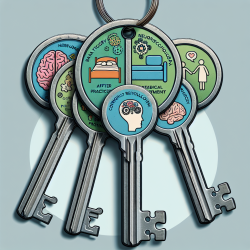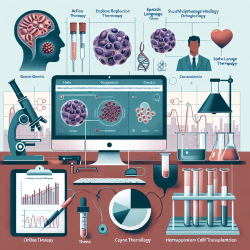Understanding the Critical Role of Aftercare in Brain Tumor Surgery
Brain tumor surgery is a complex medical procedure that demands not only surgical precision but also a comprehensive aftercare plan to ensure optimal recovery and quality of life for patients. A recent study titled "The Aftercare Survey: Assessment and Intervention Practices After Brain Tumor Surgery in Europe" sheds light on the current practices and highlights areas for improvement. This blog will explore the key findings of this research and how practitioners can enhance their skills to improve patient outcomes.
Key Findings from the Research
The study surveyed 38 European centers and revealed that while many institutions offer neuropsychological assessments and interventions post-surgery, there is significant variability in practices. Here are some critical insights:
- Most centers provide assessments for speech/language and cognition, particularly during early recovery stages and long-term follow-up.
- Emotional well-being and health-related issues are less frequently assessed, despite their importance in holistic recovery.
- There is a lack of standardized protocols for the timing and type of assessments and interventions, leading to inconsistent care.
- Support programs for caregivers are not universally implemented, although they are recognized as beneficial.
Recommendations for Practitioners
Based on the study's findings, here are some recommendations for practitioners looking to improve their aftercare practices:
- Standardize Assessment Protocols: Develop and implement standardized protocols for neuropsychological assessments that include speech/language, cognition, and emotional well-being at multiple stages post-surgery.
- Tailor Interventions: Customize rehabilitation plans based on individual patient needs, considering factors such as tumor grade, surgical outcomes, and personal goals.
- Enhance Caregiver Support: Establish support and educational programs for caregivers to help them manage their roles effectively and reduce their burden.
- Promote Multidisciplinary Approaches: Encourage collaboration among neurosurgeons, neuropsychologists, speech therapists, and other healthcare professionals to provide comprehensive care.
Encouraging Further Research
The study highlights the need for further research to develop evidence-based guidelines for post-surgical care. Practitioners are encouraged to engage in research initiatives and contribute to the growing body of knowledge in this field. By doing so, they can help shape future practices and improve outcomes for patients undergoing brain tumor surgery.
Conclusion
The aftercare of patients undergoing brain tumor surgery is a critical component of their recovery journey. By implementing the recommendations outlined in this blog, practitioners can enhance their skills and contribute to better patient outcomes. For those interested in delving deeper into the research, the original study provides a comprehensive overview of current practices and areas for improvement.
To read the original research paper, please follow this link: The Aftercare Survey: Assessment and Intervention Practices After Brain Tumor Surgery in Europe.










